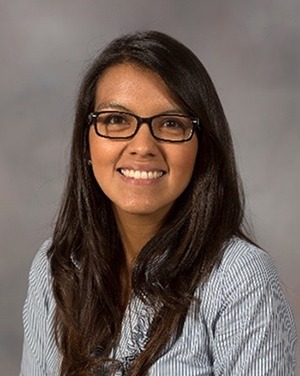MINDing the Gap: From Trainee to Tenure Track
NIDCR-funded diversity program supports transition to research independence
As a newly minted assistant professor at Rutgers University, dentist-epidemiologist Modupe Coker, DDS, PhD, typically starts her day early in the morning to check in with colleagues in her native Nigeria. She’s leading a group of researchers who are studying Nigerian children to better understand how early life exposures affect microbial communities in the mouth. After the team check-in, Coker spends much of her day analyzing the data they’ve collected. And over the last several months, she’s been navigating the NIH grant application process to secure funding for her study and to hire the personnel and equipment she’ll need to launch her Rutgers lab. She’s also juggling the administrative responsibilities expected of tenure-track faculty. And, like most early-stage researchers, Coker is doing nearly all of it on her own.
"Not only do I have to manage my professional responsibilities, but I’m also raising young kids, tending to my own mental and physical health, and all the other things life throws at you, like the pandemic,” Coker says.
This stage of a scientist’s career—the transition from trainee to independent investigator—can be a challenging time when many are at risk of leaving the biomedical workforce. For scientists from diverse or underrepresented backgrounds, these difficulties can be compounded by inequitable access to funding, training, and workforce opportunities.
As part of NIH’s ongoing efforts to retain a talented and diverse pool of early-stage researchers, NIDCR supports an initiative called Mentoring an Inclusive Network for a Diverse Workforce of the Future (MIND the Future), launched in 2020 by the American Association for Dental Research (AADR). The program’s goal is to support a diverse group of early-stage scientists in developing independent research careers dedicated to improving dental, oral, and craniofacial health.
“Diversity of thought, perspectives, and skills are critical to solving complex scientific problems,” says NIDCR Director Rena D’Souza, DDS, MS, PhD. “To strengthen the scientific enterprise, NIDCR is strongly committed to enhancing the diversity of the dental, oral, and craniofacial research workforce through programs like MIND the Future, which aims to support early-stage researchers during a critical transitional period in their careers.”
Coker is one of ten mentees in the inaugural cohort of the program. Participants are matched with experienced investigators for up to a year of one-on-one mentoring. Mentees attend weekly instructional sessions on grant-writing, publishing, and other career-related skills, and they receive peer-to-peer support from their fellow mentees. MIND the Future also provides mentors and mentees with training designed to build mentorship skills.
More than halfway through the program’s first year, the MIND mentees are already seeing benefits.
“We’re being taught the anatomy of the grant-writing process—the specific aims, budget section, and personal statement,” says Coker. “Most researchers are never taught these things, and many, including me, often wing it. But for the first time, I’m learning how to do it the right way.”
The participants also share their grants-in-progress with fellow mentees and the program leaders for group critiques.
Stephanie Momeni, PhD, a postdoctoral researcher studying small molecule metabolites of the oral microbiota at Oregon Health & Science University, likens the group sessions to a study section, a group of scientists from the community who are charged to evaluate grant applications in their field of expertise.
“Hearing the perspectives of my peers, who in a few years could be the people reviewing my grants, has been really important in informing my own approach to grant writing,” says Momeni.
The mentees are also learning what Momeni calls “soft skills,” such as networking, mentoring, and balancing professional and personal responsibilities.
"Building a professional network—developing relationships with other scientists based on common interests—can really help someone gain recognition and establish their career,” says Lynn King, PhD, chief of NIDCR’s Research Training and Career Development program. King helps to administer the MIND the Future program.
“When you’re an early-stage scientist and not yet well-established in your field, it can be hard to approach someone at a meeting and sell your research ideas,” says Susana Maria Salazar Marocho, PhD, an assistant professor who is studying dental ceramics at the University of Mississippi Medical Center. “My MIND mentor and I brainstormed my ideas, and his honest feedback—identifying both the strong points and areas that need more work—really helped me recognize the merit of my research.”
Salazar Marocho, Momeni, Coker, and their fellow mentees have become a close-knit group, even establishing their own regular “coffee hour” meetings outside the program. In these sessions, they share ideas and advice, career-related or otherwise.
Coker says, “I call it a ‘peer therapy session’. It’s just nice to know that there are other people in similar situations that you can share experiences with and lean on.”
According to King, this peer-to-peer mentoring was an intended outcome of the program. “The idea is that the current mentees can become peer mentors for the next MIND cohort, and so on, so that the peer network continues to expand through the years,” says King.
Coker adds, “My mentor has become my friend, and our relationship will definitely endure,” she says. “I don’t think this program is ending for me in September—even if it’s not in a formal setting, I’d like to work with everyone for as long as I can.”
Interested in joining the second cohort of MIND the Future? AADR is now accepting mentee applications through May 7, 2021, and mentor applications through June 30, 2021.
Related Links
- AADR Now Accepting AADR MIND the Future Applications
- AADR MIND the Future - Mentee Application
- AADR MIND the Future - Mentor Application
Attention Editors
Reprint this article in your own publication or post to your website. NIDCR News articles are not copyrighted. Please acknowledge NIH's National Institute of Dental and Craniofacial Research as the source.
Subscribe for NIDCR Updates
Receive email updates about the latest advances in dental, oral, and craniofacial research.
November 2024



